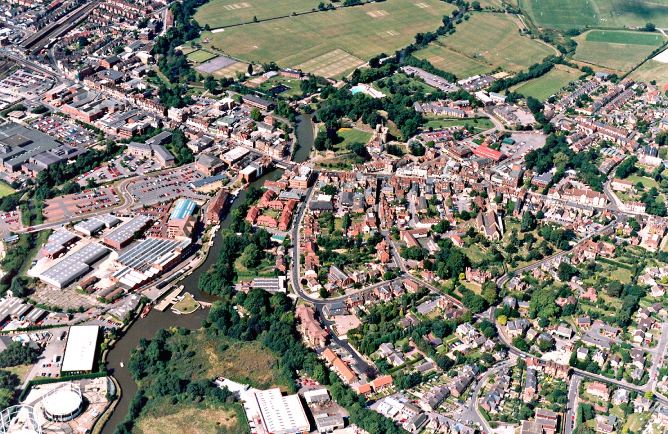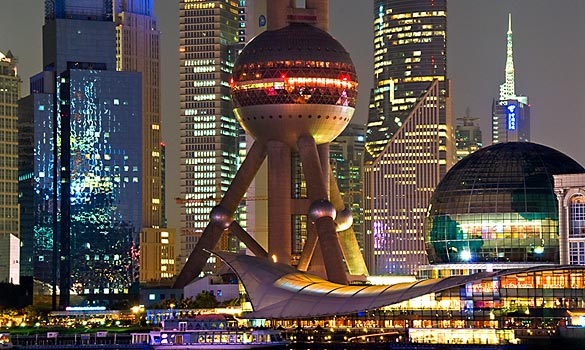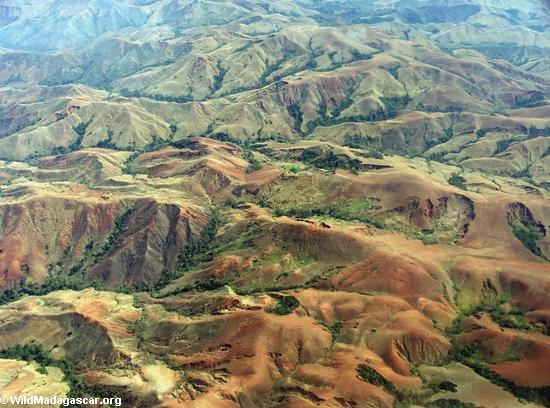326: How we messed up - perspectives for Western European
06-04-2010
 PropertyInvesting.net team www.google.com
PropertyInvesting.net team www.google.com
We Messed Up: The simple truth is that we’ve all collectively messed up the planet in the last fifty years. There is no use denying it. The legacy for our children will be a tough one. The reasons are:
· The global population has doubled in this time - from 4.2 billion to 9.5 billion people
· The rainforests have halved
 · Peak Oil is now behind us – it happened in July 2008 for all liquids and 2005 for crude oil – oil is on a bumpy plateau and will start an irreversible decline shortly
· Peak Oil is now behind us – it happened in July 2008 for all liquids and 2005 for crude oil – oil is on a bumpy plateau and will start an irreversible decline shortly
· Temperatures are warming and water shortages loom - ice caps melting, biodiversity crashing
It's no one person's fault. It's the global system that has been created that has been incapable of putting measures in place to prevent deforestation, massively increasing populations in some of the poorest areas whilst ignoring energy conservation, denying we have already reached Peak Oil, and assuming everything will be fine in the future. Very hard questions - how do you reduce deforestation, forest burning, gas guzzling cars and inefficient use of resources. No government seems to have made any real progress - and we muddle into a crisis situation almost by stealth. All eyes are currently on a live video feed of an oil leak 1000m below the sea in the Gulf of Mexico (and we saw a bird covered in oil today for the first time). Meanwhile forests continue to be cut down, animals driven out, oil supply shortages loom, no action is being take on looming food shortages and the population explosion.
It’s Too Late: No amount of technology can help most of these issues – it’s rather too late for that. We are about ten years too late for Peak Oil, 25 years too late for Climate Change, 40 years too late for deforestation and 50 years too late for population control. (for links to charities that can help, please view bottom of this report)
 Looming Crisis: Meanwhile the population continues to increase at a dramatic pace. Energy shortages loom. No concerted efforts are being made to switch to renewable energy and electric transportation. In any case, electricity adds to the carbon footprint – sometimes even more than petrol power if coal is used to generate electricity. There is almost nothing being done globally on the deforestation issue. Biodiversity is decreasing and fish stocks are collapsing in many areas. The ice caps have started melting – with no end in sight. Sea levels are rising. Madagascar in 1960 was pristine forest. It’s almost completely denuded of forest now – check GoogleEarth. The Amazon rainforest is half the size now compared with 1960. Deforestation is probably the single biggest mess we have seen on this planet. Inefficient use of oil could be the second - with USA's 5% of the population using 25% of the world oil - meanwhile importing 15% of world production. It's not sustainable.
Looming Crisis: Meanwhile the population continues to increase at a dramatic pace. Energy shortages loom. No concerted efforts are being made to switch to renewable energy and electric transportation. In any case, electricity adds to the carbon footprint – sometimes even more than petrol power if coal is used to generate electricity. There is almost nothing being done globally on the deforestation issue. Biodiversity is decreasing and fish stocks are collapsing in many areas. The ice caps have started melting – with no end in sight. Sea levels are rising. Madagascar in 1960 was pristine forest. It’s almost completely denuded of forest now – check GoogleEarth. The Amazon rainforest is half the size now compared with 1960. Deforestation is probably the single biggest mess we have seen on this planet. Inefficient use of oil could be the second - with USA's 5% of the population using 25% of the world oil - meanwhile importing 15% of world production. It's not sustainable.
Rainforests Disappear: Rainforests in 1960 covered 14% of the worlds area. They are now down to 6%. In 40 years, NGOs think they will be consumed - yes, no remaining rainforests. That's a crisis - and because rainforests cool the environment, prevent soil erosion, pump out O2 and consume CO2, they help reduce global warming. They anchor carbon. Most rainforests are burnt to provide grazing land for beef, sometimes to grow arable crops, sugar cane - and sometimes just to build homes, often not even to be farmed. It's a depressing state of affairs.
Madagascar: This was tropical rainforest in 1965 - now its a hot desert with soil erosion. Forests plundered. Half of rainforests have disappeared since 1965. The rest are likely to disappear in the next 40 years - according to experts.
Problems To Big for Individuals: It’s all rather distressing. As an individual you cannot fix these problems – we can all try and help, but the human nature and behaviour of being one person in 9 billion is not conducive to solving the world’s problems. Even if you were President, it would be very tough to make a big difference - its more the case of mitigating against problems on the horizon. But we see little evidence of this. The extent of the issues seem to be ignored. We have to try and get local, stay local and position ourselves and our immediate family and friends for the bumpy ride ahead.
 Good News on Security: The good news is that – despite all the bad news – much of which is amplified in the media – the world is more peaceful than it ever has been. Fewer people are killed in wars than at any time in the last 100 years. Terrorism has dropped. Iraq and the Middle East is far more peaceful. Travel and tourism make world travel and adventure possible – albeit at the cost to the environment. And we have lived through an unprecedented period of global economic growth in the western world off the back of cheap easy oil. This is just getting started now in China and India – they are 40-50 years behind the USA in their development but they will rapidly catch up. They will need huge supplies of commodities to build cities and fleets of cars and trucks. Demand for commodities will increase along with this growth and the global population growth.
Good News on Security: The good news is that – despite all the bad news – much of which is amplified in the media – the world is more peaceful than it ever has been. Fewer people are killed in wars than at any time in the last 100 years. Terrorism has dropped. Iraq and the Middle East is far more peaceful. Travel and tourism make world travel and adventure possible – albeit at the cost to the environment. And we have lived through an unprecedented period of global economic growth in the western world off the back of cheap easy oil. This is just getting started now in China and India – they are 40-50 years behind the USA in their development but they will rapidly catch up. They will need huge supplies of commodities to build cities and fleets of cars and trucks. Demand for commodities will increase along with this growth and the global population growth.
Good News On Food: The other good news is that starvation compared to years ago has almost been eradicated – if the UN, EU and USA find people starving, they fly in food and make food drops. This can happen within days. This is the benefit of cheap oil, airline technology and the massive wealth this has created. But what happens when aviation fuel shortages start. Government hoard fuel. Then if people starve, it could be a different story. Social unrest cannot be quelled as easily if security and humanitarian forces cannot get access because of fuel shortages. This is one of the key concerns with the five key issues of population increase, water shortages, food shortages, Peak Oil and climate change. The amount of social unrest and people starving could increase – and regrettably governments might have enough on their plate with their own Peak Oil challenges (fuel and food shortages and debt) to be able to offer the same help as they do now, in the future.
 UK Challenges: For UK citizens, we expect the next ten years to shape up to be challenging – far more challenging for most people than they think. The need to reduce debt is serious and severe – because we’ll need the money to change infra-structure to cope with Peak Oil and the end of global food and goods shipments – and to develop local manufacturing supply chain systems again. The key reasons for the challenges are:
UK Challenges: For UK citizens, we expect the next ten years to shape up to be challenging – far more challenging for most people than they think. The need to reduce debt is serious and severe – because we’ll need the money to change infra-structure to cope with Peak Oil and the end of global food and goods shipments – and to develop local manufacturing supply chain systems again. The key reasons for the challenges are:
· Population increase – the UK’s population will rise from 60 to 70 million by 2030 – the seeds of this rise have been sown in the last 13 years as immigration has increased and the size of families has increased. The UK will be the largest European country by population in 2030 (bigger than Germany).
· Climate Change – if you believe the scientific experts in this field, it’s most likely the UK temperatures will rise on average by 2 to 5 deg C between now and the end of the century. Temperatures in London used to be very infrequently above 25 deg C – by 2050 – in the summer, it’s likely to be commonly in the maximum 28 to 32 deg region. Winters will be wetter. Winds will be stronger. Summers will be drier and hotter. The south coast will have vineyards. Overall – the weather is likely to improve. Less cold winters, warmer summers. More sun in the summer. But bigger storms.
· London will continue to grow – another million people in the next ten years. Where they will live will become a pressing issue because only 20,000 new homes are being built in the region at present – so property prices will continue to drift higher and rental prices will rise sharply. Not enough buy-to-let investors to feed the market. Almost no social housing will be built.
· Peak Oil Effects: The effects of Peak Oil will start to be felt in a few years time. By 2015 there are likely to be pretty severe shortages. The good news is – by then – the UK will at least still be producing half of its oil needs. Energy conservation will become a key theme for governments. Periods of power shortages will start to be noticed as under development of the electricity grid and power units starts to show the strains. Nuclear power stations will be decommissioned and very few new plants will replace them. Wind energy will expand, but not nearly enough to offset closing low efficiency coal burning and nuclear power plants. LNG imports from Qatar and piped gas from Norway and Russia will become key energy supplies for the UK for gas to power plants that will expand to make up the shortfall. Because of diverse LNG supplies, gas security of supply could actually improve to offset the threat of Russia diverting flows in eastern Europe.
· Water: The good news is, the UK has plenty of water. It also has some very fertile farmland – plenty enough to feed the population as long as it receives enough fertiliser (phosphorous etc)
 Projects Cancelled – Too Expensive: Large infra-structure projects will be deferred and cancelled – the reason being – they are too expensive. Yes, with oil prices well over $100/bbl – the UK will not be able to afford these. The benefits will also be challenged. The old road and rail networks will need to take the strain of an ever increasing population. People will work from home more, start travelling less – and lifestyles might actually improve as people use technology more and spend less time in traffic jams ferrying people around or going on aimless trips. Petrol prices and taxes will rise to try and drive people off the roads. Toll roads will become more common. Travelling by plane will become far more expensive as airlines are tax (fuel duties start). The government will wake up to the fact that petrol taxes are 80% for Joe Public whilst airline fuel taxes are zero for the much travelled bigger carbon printers.
Projects Cancelled – Too Expensive: Large infra-structure projects will be deferred and cancelled – the reason being – they are too expensive. Yes, with oil prices well over $100/bbl – the UK will not be able to afford these. The benefits will also be challenged. The old road and rail networks will need to take the strain of an ever increasing population. People will work from home more, start travelling less – and lifestyles might actually improve as people use technology more and spend less time in traffic jams ferrying people around or going on aimless trips. Petrol prices and taxes will rise to try and drive people off the roads. Toll roads will become more common. Travelling by plane will become far more expensive as airlines are tax (fuel duties start). The government will wake up to the fact that petrol taxes are 80% for Joe Public whilst airline fuel taxes are zero for the much travelled bigger carbon printers.
Airline Travel for Rich: As oil prices rise, airline travel will drop as will sea transport of goods. More products will be produced locally and regionally using trains and short haul barges for transport thereby  saving fuel. More marginal land in the UK will be converted to productive agricultural land. There will be more market gardens, less beef and more arable and vegetables and fruits grown locally. For the property investor, land will be a good investment – especially marginal low priced land and scrub that can be converted to productive farmland. The days of airlines transporting strawberries and apples from South Africa and South America will be over. Produce will be more seasonal as it was in the 1950s.
saving fuel. More marginal land in the UK will be converted to productive agricultural land. There will be more market gardens, less beef and more arable and vegetables and fruits grown locally. For the property investor, land will be a good investment – especially marginal low priced land and scrub that can be converted to productive farmland. The days of airlines transporting strawberries and apples from South Africa and South America will be over. Produce will be more seasonal as it was in the 1950s.
Lifestyle Improvements: The bad news is – we’ve really messed up the planet. The good news is that in the UK, lifestyles might actually improve. Despite the population increase, it might be less noticeable because people will be travelling less. Yes, when people travel – it will be more overcrowded and still creaking, but the use of the internet, telephones, video-conferencing via iPads, PCs and iPhones will cut the need for a lot of travel. Companies will get used to people being in the office only 3 days a week. Companies and the public sector will encourage people to cycle. Car parking in cities will be at a premium – get even more expensive.
BRIC: India will boom. China will boom. Brazil will boom. Russia will boom. USA will struggle with the weight of debt with healthcare costs ($6500 per person per year) and oil import costs ($1500 to $3000 per  person per year).
person per year).
PIGS: The PIGS countries – Portugal, Italy, Greece and Spain will suffer from:
· Declining populations
· Aging populations
· Low efficiency manufacturing decline
· Global warming – temperatures rising to 40 deg C in mid summer
· Water and power shortages
· Massive unsustainable oil, gas, coal, energy and metals import bills
· Decline in tourism and airline travel
· Fertiliser shortages – strains on agricultural productivity and high cost of imports
They will have to exit the Euro to devalue their currencies and start setting interest rates to match their economic efficiency and growth.
Cool North: Cooler northern European countries should fare better as temperatures rise, water shortages are far less severe and populations stay more stable.


Oslo
Norway The Coolest Place to Be: Norway will be the real winner because of its foresight in developing renewable energy even though it has the largest oil and gas exports per person by far in Europe. Hydro-electric schemes. Wind. Tide. Biomass. They will all help maximise oil exports and gas exports and minimise and conserve indigenous oil and gas supplies. Meanwhile the small but expanding population of 5 million will be flush with cash. The sovereign wealth fund will become gigantic in value. Property prices will continue to rise. Water shortages will be non-existent. Corruption will remain almost non-existent. Security and safety will remain high. The country will stay protected from debt, contagion, global warming, water and food shortages – the affects of Peak Oil will be positive to their balance sheets. Norway is the next Switzerland.
If you are seriously concerned about the state of the Euro and UK economies and rising tax burdens, Norway is an interesting opportunity. If you are serious - then you need to learn the language - and be prepared for cold winters, introvert population (takes a long time to break into social networks) and high tax on alcohol. If you like skiing, are introvert yourself, and want to quietly generate wealth - its probably the best place in Europe long term.
Framing An Opportunity: We hope this Special Report has help frame some property investment opportunities for you – high level in the future. The key message is – don’t get caught out by Peak Oil, debt contagion and the ravages of weather, water and foot supply – in a European context. We will do a Special Report in future on the outlook for other continents – Africa for example with its challenges. But for now, we hope Western Europe has stimulated some thoughts on property and land investments – protected from the key challenges facing the world in the next twenty years.
If you have any comments, please do not hesitate to contact us on enquiries@propertyinvesting.net
Food shortages loom with underlying cause Peak Oil

Madagascar Deforestation

Southern Madagascar deforestation by satellite

North Pole will disappear by 2050

Peak Oil is history now

Drought will affect more areas of Africa in the next few decades - deforestation has not helped

Madagascar Alaotra Grebe - extinct - as of May 29th 2010 - after combination of predatory carivorous fish introduced into lake and poaching.

Only known remaining photo of now extinct Grebe

Artist's impression - extinct as of 26 May 2010 like the Dodo
Charity and NGO Links
Médecins Sans Frontières (MSF)
Society for the Protection of Animals


